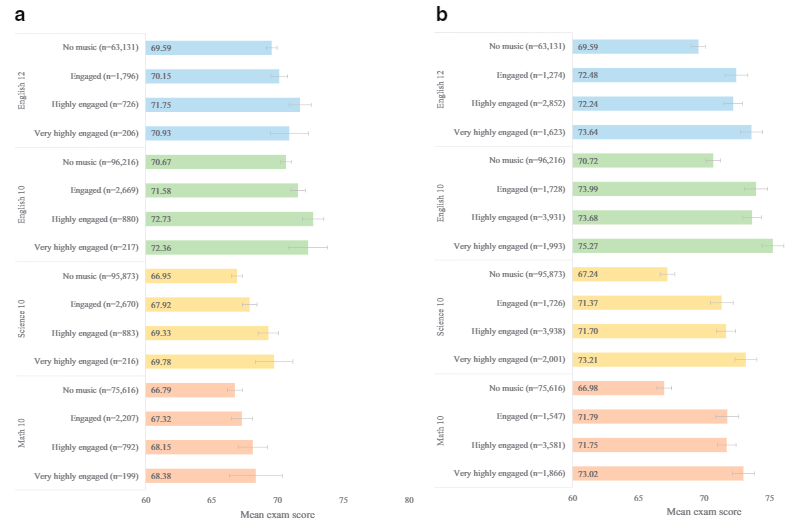Learning a musical instrument helps children to achieve higher grades. Here's why

There appears to be a link between playing music and academic performance.
Image: REUTERS/Carlos Jasso
Stay up to date:
Canada
Secondary school students who take music classes in school perform better in math, science and English than their nonmusical peers, according to a new large-scale study in British Columbia. And the more involved students are in their school music programs, the higher their academic exam scores tend to be.
The study, published in the American Psychological Association’s Journal of Educational Psychology on Monday, examined the school records of nearly 113,000 public school students in B.C. It found those who took music classes over many years, starting as early as Grade 5, had higher Grade 10 and Grade 12 exam scores in math, science and English than those who did not participate in music.
This was particularly the case among students who learned to play an instrument (compared with vocal music) and were more involved in their school orchestra and band programs, said Peter Gouzouasis, a professor at the University of British Columbia and one of the study authors. (The study did not look at the effect of private music lessons.) These highly engaged music students were, on average, one year ahead of their nonmusical peers in academics, he said.
The study adds to a large body of research that ties music education to higher cognitive performance and academic achievement. But researchers remain divided over how to interpret these findings: does learning music really make children smarter? Or, are children who do well in school more likely to learn music?
Glenn Schellenberg belongs to the latter camp. A professor of psychology at the University of Toronto, Dr. Schellenberg authored an oft-cited 2004 study that suggested music lessons boosted children’s IQ. However, he said he has since come to believe this conclusion was flawed, as other researchers have failed to replicate his findings.
“Since then, I’ve been examining the question in much more detail and looking at kids in the real world,” he said, adding he now believes other factors, such as pre-existing individual differences in their personalities and academic abilities, are more likely to explain why music students and nonmusic students perform differently in school.
“The notion that music training is the causal agent … is just ridiculous,” he said.
Dr. Gouzouasis, however, said his new population-level study comes as close as possible to showing that playing music does, in fact, lead to academic success, since it controlled for variables such as students’ gender, ethnicity, earlier academic achievement and their neighbourhood socioeconomic status.
The study also provides evidence to support music education – particularly teaching students to play instruments – in public schools, he said.
“Schools, school districts, provinces need to seriously look at this work and consider reinstating music programs where they’ve been cut,” said Dr. Gouzouasis, a professor of education in UBC’s department of curriculum and pedagogy.
Dr. Gouzouasis said there are likely multiple reasons why music may boost students’ academic scores. Music involves anticipation, memory and synchronizing with others – all activities related to executive functioning. In other words, it involves the brain’s ability to focus, organize information, and regulate thoughts and emotions, he and his team suggest.
Music may also enhance one’s motivation to learn, since it involves practice, self-discipline and mastering complex skills, the researchers added.
Margaret Lai of Coquitlam, B.C., said she encouraged her two children, Emanuel, 11, and Emilyn, 13, to learn to play cello and violin, respectively, for many of these reasons. There are few activities, with the exception of sports, that require such intense focus of one’s mind, ears and body, she said. Both of her children perform in the Coquitlam Youth Orchestra, and both excel in school.
“I think [music] makes connections in your brain that otherwise wouldn’t be made,” said Ms. Lai, who is a piano teacher herself.
Ms. Lai said she believes having music programs in schools is “absolutely essential,” especially since not everyone has access to private music lessons. She likened music to learning a second language – one that is universal.
For his part, Dr. Schellenberg said he is not against music. But justifying it based on academic benefits is not only scientifically flawed, he said, it also takes away from the idea of learning music for music’s sake.
Music is “the thing that brings people together and creates social bonding and makes us feel fantastic,” he says. “If that’s not enough, then I don’t know what is.”
Don't miss any update on this topic
Create a free account and access your personalized content collection with our latest publications and analyses.
License and Republishing
World Economic Forum articles may be republished in accordance with the Creative Commons Attribution-NonCommercial-NoDerivatives 4.0 International Public License, and in accordance with our Terms of Use.
The views expressed in this article are those of the author alone and not the World Economic Forum.
Related topics:
Forum Stories newsletter
Bringing you weekly curated insights and analysis on the global issues that matter.
More on Education and SkillsSee all
Stacy Greiner
July 1, 2025
Jean Daniel LaRock and Ashley Hemmy
June 23, 2025
Roberta Vicente Barreras
June 19, 2025
Steven Sim
June 10, 2025
Natalia Kucirkova
June 10, 2025
Morgan Camp
June 6, 2025






